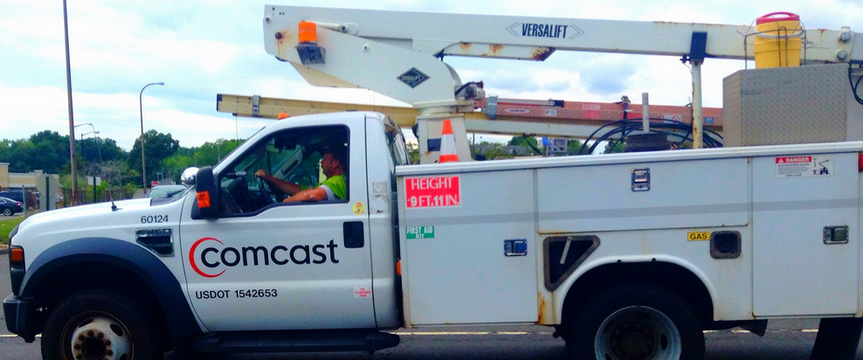Could Comcast Try To Buy Netflix Or T-Mobile If Time Warner Cable Deal Fails?
Of course, if Comcast is blocked from acquiring TWC, it could just take that $45 billion and invest it in improving service and providing new options for its 22 million subscribers.
But in a blog post [registration required], Richard Greenfield at BTIG Research contends that Comcast’s wealth and “insatiable appetite for acquisitions” indicate that the company would not simply sit idle when there are other merger options available that might not raise the same regulatory red flags as the bid to buy TWC.
Comcast, which acquired the expansive NBC Universal broadcast/cable/theatrical production and distribution network in 2011, could try to go even further into the world of content by acquiring other media companies.
A more intriguing idea would be the acquisition of the company that has been one of Comcast’s most outspoken critics in recent years — Netflix.
While Greenfield acknowledges that “acquiring Netflix would be massively dilutive to Comcast shareholders,” he points out that Netflix has been able to do what many traditional media companies have failed to do — create a streaming product that works well across the wide array of platforms and devices.
Acquiring the Netflix team and technology would be a boost to Comcast’s pay-TV and broadband services, while also undoubtedly building Netflix into all possible set-top boxes for the nation’s largest cable provider.
And though Greenfield doesn’t mention it, we’d be shocked if a regulatory condition on a Comcast/Netflix merger didn’t include a condition that Comcast make Netflix available for other pay-TV providers’ set-top boxes.
But that brings up the question of whether or not the FCC/DOJ reviewers would sign off on such a deal. We’d expect there to be a vocal grassroots effort, similar to the one currently opposing the TWC acquisition, speaking out against a Comcast/Netflix deal. And if the TWC deal falls through, Comcast’s opponents would only be emboldened for another fight.
And unlike the pending mega-deal, in which Comcast and TWC claim to not compete, there is no doubt that Netflix is competing directly with Comcast. So it’s hard to imagine the nation’s largest pay-TV provider being allowed to absorb a service that many view as the poster-child for cord-cutting.
So while Greenfield believes that Comcast could possibly woo Netflix’s board into agreeing to a deal if the offer were “truly compelling,” we have serious doubts that the company would jump right into another acquisition that isn’t a sure thing with regulators.
A more likely option presented by Greenfield is for Comcast to go the wireless route and try to acquire either T-Mobile or Sprint.
Since Sprint is now controlled by Japanese telecom giant Softbank, which has been more interested in acquiring businesses than selling off the company, T-Mobile is the more likely partner. After all, its German parent company is still trying to sell it off.
And it could be a wise move for Comcast, not only acquiring T-Mo’s approximately 50 million accounts but allowing it to offer a fixed wireless broadband service much like the one planned by AT&T.
The whole purpose of Comcast acquiring TWC is to get into the NYC and L.A. markets and provide geographic continuity for its services in the nation’s most populated corridors.
While a T-Mobile merger wouldn’t give Comcast immediate pay-TV access to those regions, it could exploit T-Mo’s existing cell towers and LTE network to offer more affordable wireless broadband and sell standalone streaming services like the ones that NBC is reportedly mulling over.
Whether or not Comcast pursued such a deal will almost certainly depend on the outcome of the pending merger of AT&T and DirecTV. If regulators sign off on that acquisition with minimal concessions, T-Mobile may be seen as a merger target for some complementary company. And if Comcast and TWC are broken up at the altar, it could be Kabletown calling for T-Mo’s hand in marriage.
Want more consumer news? Visit our parent organization, Consumer Reports, for the latest on scams, recalls, and other consumer issues.


